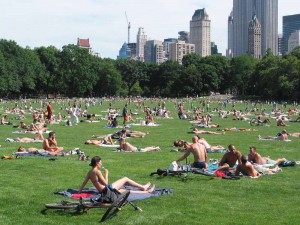 Over 3,350 record high temperatures were broken this March in the eastern two-thirds of the United States, and humans traipsed through their daily lives as usual, albeit in shorts and sundresses.
Over 3,350 record high temperatures were broken this March in the eastern two-thirds of the United States, and humans traipsed through their daily lives as usual, albeit in shorts and sundresses.
As a champion worrier, I had trouble acting nonchalant during the historic heatwave. The response I received upon anxiously (and constantly) mentioning this year’s outrageous weather astonished me:
“Yes, this weather is bizarre. Yes, it is probably the result of climate change. But it is also pleasant, and we should enjoy it.”
Sure, every cloud has its silver lining — or every sun ray has its, you know, sunny ray. But my climate anxiety makes it hard to leave my apartment and face the surreal heat, never mind enjoy it. Each warm breath of breeze is a chilling reminder of the watery apocalypse to which humans are dooming the planet.
Climate apathy is not universal — follow Bill McKibben on Twitter if you’re prepared for twice-hourly panic attacks — and even President Obama voiced his nervousness in a speech last week. But in general, on the ground, everyone’s utter normalcy is awakening in me a truly Kafkaesque alienation. As in Kafka’s surreal stories, the stable world is unraveling — deaths are impending — the absurd is made tangible — it’s 84 degrees on a March day in Maine — and no one seems alarmed or, more importantly, willing or able to communicate about the impending catastrophe.
Giles Deleuze and Felix Guattari have a theory for Kafka’s alienation that oddly resembles my own climate alienation. In a minute nutshell shard, Deleuze and Guattari suggest that Kafka’s writing is influenced by the fact that he wrote in the German language, while living in German-controlled Czech-speaking Czechoslovakia, while associating with Hebrew/Yiddish-speaking Czech-Jewish circles. Kafka’s German was the language of political power and public life, not the language of his intimate circle of friends and relations. German was strange, unknowable, bureaucratic — a tongue of terrifying otherness. This strangeness-of-communicative-
And why are such hot days so horrifying? Deleuze and Guattari also say that Kafka’s use of German de-territorializes the language: German stops being a language attached to a specific place. Literature like Kafka’s is a globalizing force, bringing a minor (Czech, Jewish) perspective to a major language (German) and its broader readership. German is no longer specific to Germany.
As Kafka de-territorialized German, global warming is de-territorializing climate. I’m using the less-correct term “global warming” here to emphasize the globality of the climate crisis: all of the planet’s trillions of organisms will bear the brunt of extreme weather-pattern shifts, super-strong storms, and rapidly rising seas. But “climate change” is the better term as it prevents delusional deniers from claiming that cold-weather events, like the freakishly frigid European winter and this past October’s bizarre snowstorm, prove that the planet isn’t ‘warming.’ Of course, such unprecedented events are evidence that the global climate is changing fast. Never before would you find 16 feet of snow blanketing the English countryside; never before would you find sunbathers in late-winter Chicago. Weather patterns are de-coupling from the territories whose biotic rhythms they’ve determined for millennia.
Or to put it bluntly, climate change is destroying the idea of place. It’s a cliché that globalization is doing this too: air travel defeats distance, international retail chains make any place look like any other place, and the internet spews the same information to everyone everywhere. So in a sense climate change is contiguous to the changes humans have already wrought on our societies and on the planet. Climate change might not even be categorically bad; the Earth’s climate has undergone many major shifts throughout its long history and is best viewed as existing in a state of continuous flux.
But climate change is bad for my old-fashioned, place-centered self. The fact is, I miss winter. I grew up in Massachusetts, where the snow (used to) cover(s) the ground all the (long) winter. The freeze created coziness for a while; by late March, it got tiresome, and you’d start praying for the thaw, for the first hints of green, praying that an April blizzard wouldn’t stop the crocuses from pushing their heads through the sodden soil. When spring finally sprang, the warmth felt earned.
In 2012 Boston, forget the thaw: my dad is already dragging his beach chair to the front lawn, the better to enjoy the 80-degree heat while doing his crossword puzzle. He rejoices; my heart aches for the weather that used to define my hometown.
Indeed, it’s possible that my horror at the prospect of climate change is just a form of nostalgia for the winters of my childhood, nostalgia for the dying fiction of place. Still, as we’re a nostalgic species, I’m shocked that there isn’t more public anxiety over this latest heat wave. I’m shocked to enter the outside world and discover no familiar language for expressing astonishment, fear, and outrage over the latest manifestations of climate change. Shocked to find myself suddenly a stranger, mute and uncomprehending, in a sweltering land I thought I knew.
This post may contain affiliate links.








